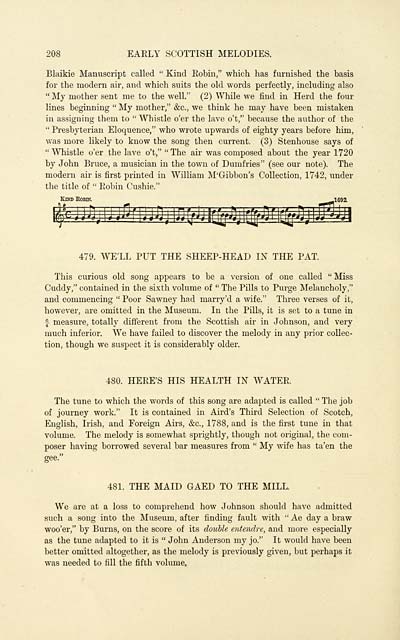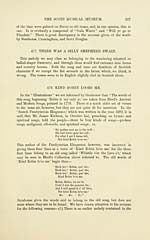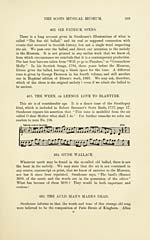Inglis Collection of printed music > Printed text > Early Scottish melodies
(230) Page 208 - We'll put the sheep-head in the pat
Download files
Complete book:
Individual page:
Thumbnail gallery: Grid view | List view

208
EAELY SCOTTISH MELODIES.
Blaikie Manuscript called " Kind Eobin," which has furnished the basis
for the modern air, and which suits the old words perfectly, including also
" My mother sent me to the well." (2) While we find in Herd the four
lines beginning " My mother," &c, we think he may have been mistaken
in assigning them to " Whistle o'er the lave o't," because the author of the
" Presbyterian Eloquence," who wrote upwards of eighty years before him,
was more likely to know the song then current. (3) Stenhouse says of
"Whistle o'er the lave o't," "The air was composed about the year 1720
by John Bruce, a musician in the town of Dumfries" (see our note). The
modern air is first printed in William M'Gibbon's Collection, 1742, under
the title of " Eobin Cushie."
Kind Eobin.
fc
^^1692
s
479. WE'LL PUT THE SHEEP-HEAD IN THE PAT.
This curious old song appears to be a version of one called " Miss
Cuddy," contained in the sixth volume of " The Pills to Purge Melancholy,"
and commencing " Poor Sawney had marry'd a wife." Three verses of it,
however, are omitted in the Museum. In the Pills, it is set to a tune in
£ measure, totally different from the Scottish air in Johnson, and very
much inferior. We have failed to discover the melody in any prior collec-
tion, though we suspect it is considerably older.
480. HEEE'S HIS HEALTH IN WATEE.
The tune to which the words of this song are adapted is called " The job
of journey work." It is contained in Aird's Third Selection of Scotch,
English, Irish, and Foreign Airs, &c, 1788, and is the first tune in that
volume. The melody is somewhat sprightly, though not original, the com-
poser having borrowed several bar measures from " My wife has ta'en the
gee."
481. THE MAID GAED TO THE MILL.
We are at a loss to comprehend how Johnson should have admitted
such a song into the Museum, after finding fault with " Ae day a braw
woo'er," by Burns, on the score of its double entendre, and more especially
as the tune adapted to it is " John Anderson my jo." It would have been
better omitted altogether, as the melody is previously given, but perhaps it
was needed to fill the fifth volume,
EAELY SCOTTISH MELODIES.
Blaikie Manuscript called " Kind Eobin," which has furnished the basis
for the modern air, and which suits the old words perfectly, including also
" My mother sent me to the well." (2) While we find in Herd the four
lines beginning " My mother," &c, we think he may have been mistaken
in assigning them to " Whistle o'er the lave o't," because the author of the
" Presbyterian Eloquence," who wrote upwards of eighty years before him,
was more likely to know the song then current. (3) Stenhouse says of
"Whistle o'er the lave o't," "The air was composed about the year 1720
by John Bruce, a musician in the town of Dumfries" (see our note). The
modern air is first printed in William M'Gibbon's Collection, 1742, under
the title of " Eobin Cushie."
Kind Eobin.
fc
^^1692
s
479. WE'LL PUT THE SHEEP-HEAD IN THE PAT.
This curious old song appears to be a version of one called " Miss
Cuddy," contained in the sixth volume of " The Pills to Purge Melancholy,"
and commencing " Poor Sawney had marry'd a wife." Three verses of it,
however, are omitted in the Museum. In the Pills, it is set to a tune in
£ measure, totally different from the Scottish air in Johnson, and very
much inferior. We have failed to discover the melody in any prior collec-
tion, though we suspect it is considerably older.
480. HEEE'S HIS HEALTH IN WATEE.
The tune to which the words of this song are adapted is called " The job
of journey work." It is contained in Aird's Third Selection of Scotch,
English, Irish, and Foreign Airs, &c, 1788, and is the first tune in that
volume. The melody is somewhat sprightly, though not original, the com-
poser having borrowed several bar measures from " My wife has ta'en the
gee."
481. THE MAID GAED TO THE MILL.
We are at a loss to comprehend how Johnson should have admitted
such a song into the Museum, after finding fault with " Ae day a braw
woo'er," by Burns, on the score of its double entendre, and more especially
as the tune adapted to it is " John Anderson my jo." It would have been
better omitted altogether, as the melody is previously given, but perhaps it
was needed to fill the fifth volume,
Set display mode to: Large image | Transcription
Images and transcriptions on this page, including medium image downloads, may be used under the Creative Commons Attribution 4.0 International Licence unless otherwise stated. ![]()
| Special collections of printed music > Inglis Collection of printed music > Printed text > Early Scottish melodies > (230) Page 208 - We'll put the sheep-head in the pat |
|---|
| Permanent URL | https://digital.nls.uk/94646032 |
|---|---|
| Description | Also: Here's his health in water. Also: The maid gaed to the mill. |
| Description | Scottish and English songs, military music and keyboard music of the 18th and 19th centuries. These items are from the collection of Alexander Wood Inglis of Glencorse (1854 to 1929). Also includes a few manuscripts, some treatises and other books on the subject. |
|---|
| Description | The Glen Collection and the Inglis Collection represent mainly 18th and 19th century Scottish music, including Scottish songs. The collections of Berlioz and Verdi collected by bibliographer Cecil Hopkinson contain contemporary and later editions of the works of the two composers Berlioz and Verdi. |
|---|

